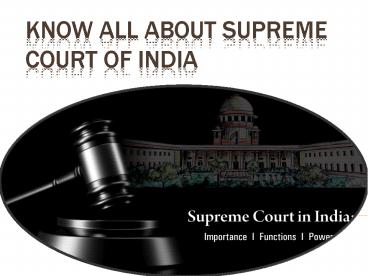Know about Supreme Court of India - PowerPoint PPT Presentation
Title:
Know about Supreme Court of India
Description:
The Supreme Court of India is the supreme judicial body of India and the highest court of India under the constitution. It is the most senior constitutional court, and has the power of judicial review. – PowerPoint PPT presentation
Number of Views:184
Title: Know about Supreme Court of India
1
Know All About Supreme Court of India
2
- As the highest court in India, the Supreme
Courts judgments are binding on all other courts
in the country. It serves both as the final court
of appeals and final interpreter of the
Constitution. Owing to these vast powers, many
including Attorney General K.K. Venugopal have
labelled it among the most powerful courts in the
world. Its authority stems from the Constitution
of India.
3
Supreme Court History
- The Federal Court of India was created as per the
Government of India Act 1935. - This court settled disputes between provinces and
federal states and heard appeals against
judgements of the high courts. - After independence, the Federal Court and the
Judicial Committee of the Privy Council were
replaced by the Supreme Court of India, which
came into being in January 1950. - The Constitution of 1950 envisaged a Supreme
Court with one Chief Justice and 7 puisne Judges. - The number of SC judges was increased by the
Parliament and currently, there are 34 judges
including the Chief Justice of India (CJI).
4
Supreme Court of India Functions
- It takes up appeals against the verdicts of the
High Courts, other courts and tribunals. - It settles disputes between various government
authorities, between state governments, and
between the centre and any state government. - It also hears matters which the President refers
to it, in its advisory role. - The SC can also take up cases suo moto (on its
own). - The law that SC declares is binding on all the
courts in India and on the Union as well as the
state governments.
5
What types of cases does it hear?
- The Supreme Court has jurisdiction over the
authority to hear a wide range of cases. Its
jurisdiction is generally classified into
original, appellate and advisory. - Under its original jurisdiction, the Court
enforces fundamental rights, hears federal
disputes and can transfer cases. As a guardian of
fundamental rights, the Court serves to protect
citizens from the excesses of the legislature and
executive. With regards to federal disputes, the
Court has the exclusive authority to settle
disputes between the Union and a state, or
between two states. Finally, its original
jurisdiction also empowers it to transfer cases
for example from one High Court to another.
6
- While cases that fall under the Courts original
jurisdiction generally garner the most public
attention, cases that fall under its appellate
and extraordinary appellate jurisdictions make up
a vast majority of its docket. Its appellate
authority allows it to hear constitutional, civil
and criminal appeals against High Court
judgments. Subject to a few exceptions, litigants
seeking to appeal a High Court judgment, must
first seek 'leave' from the High Court. Meaning,
the High Court has to certify that the appeal
entails a question that needs to be settled by
the Supreme Court.
7
Eligibility of a judge of the Supreme Court
- A citizen of India not exceeding 65 years age per
Article 124 of the Constitution who has been - a judge of one high court or more (continuously),
for at least five years, - an advocate there, for at least ten years,
- a distinguished jurist, in the opinion of the
president, power conferred by clause 2 of article
124 of the Constitution of India is eligible to
be recommended for appointment, a judge of the
Supreme Court. - Suggest Read - Supreme Court Recent Judgement































